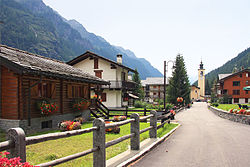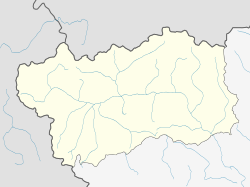Gressoney-La-Trinité (French pronunciation: [ɡʁɛsɔnɛ la tʁinite]; Gressoney Walser: Greschòney Drifaltigkeit or Creschnau Drifaltigkeit; Arpitan: Gressonèy-La-Trinità) is a town or commune and renowned alpine resort at the foot of Monte Rosa in the Val de Gressoney, which is part of the Aosta Valley region of Northwest Italy. It features one of the most scenic alpine ski resorts in the Aosta Valley.
Gressoney-La-Trinité
Greschòney Drifaltigkeit (Walser) | |
|---|---|
| Comune di Gressoney-La-Trinité Commune de Gressoney-La-Trinité Gemeinde Gressoney-La-Trinité | |
 Centre of the town | |
| Coordinates: 45°50′N 07°50′E / 45.833°N 7.833°E | |
| Country | Italy |
| Region | Aosta Valley |
| Area | |
• Total | 65 km2 (25 sq mi) |
| Elevation | 1,635 m (5,364 ft) |
| Population (31 December 2022)[2] | |
• Total | 322 |
| • Density | 5.0/km2 (13/sq mi) |
| Demonym | Gressonards |
| Time zone | UTC+1 (CET) |
| • Summer (DST) | UTC+2 (CEST) |
| Postal code | 11020 |
| Dialing code | 0125 |
| Website | Official website |
Geography
editGressoney-La-Trinité is located in a side valley of the Aosta Valley region of northwestern Italy. At 1,627 metres (5,338 ft) above sea level, it has the highest elevation of any city in the Gressoney Valley.
History
editGermanic people, known as the Walser, settled in the upper Lys Valley from the 12th century onwards.[3] Historically, Gressoney-Saint-Jean and Gressoney-La-Trinité have been two separate communes.[4]
From 1928 until 1946, the two communes were unified and officially named Gressoney. From 1939 to 1946, the name was Italianized into Gressonei. After WWII the two former communes were again reconstituted separately.[5]
Walser Culture and Language
editGressoney-La-Trinité and Gressoney-Saint-Jean form a Walser German linguistic and cultural entity known as Greschòney in Franco-Provençal or Arpitan, Kressenau in Walser German, or Kreschnau in the local Walser dialect known as Greschoneytitsch (or simply Titsch).[6]
An example of Greschòneytitsch:
| Walser German | German | English |
|---|---|---|
|
Endsche Attò |
Vater unser |
Our Father |
References
edit- ^ "Superficie di Comuni Province e Regioni italiane al 9 ottobre 2011". Italian National Institute of Statistics. Retrieved 16 March 2019.
- ^ "Popolazione Residente al 1° Gennaio 2018". Italian National Institute of Statistics. Retrieved 16 March 2019.
- ^ www
.visitmonterosa .com /en /news-en /historical-and-cultural-identities-in-gressoney / - ^ "History - Municipality of Gressoney-La-Trinité". www.comune.gressoneylatrinite.ao.it. Retrieved 2021-03-23.
- ^ "History - Municipality of Gressoney-La-Trinité". www.comune.gressoneylatrinite.ao.it. Retrieved 2021-03-23.
- ^ Flurnamen Fein Weisser Fleck. Letter by Rolf Marti, Gstaad, in: Die Alpen, June 2011, p.29
- ^ "Das Vaterunser auf Walserisch (Greschòney)" (in Walser). Frankfurter Allgemeine Zeitungs. 2006. Retrieved 2011-05-13.
External links
edit



